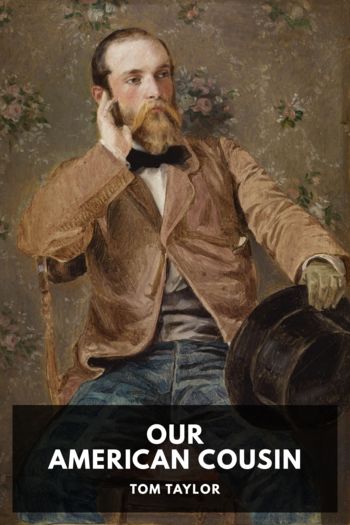Struggles and Triumphs, P. T. Barnum [good books to read in english .txt] 📗

- Author: P. T. Barnum
Book online «Struggles and Triumphs, P. T. Barnum [good books to read in english .txt] 📗». Author P. T. Barnum
This was in all respects a first-class establishment. It was elegantly fitted up, and contained, among other things, a dozen fine large paintings, such as “The Deluge,” “Cain and his Family,” and other similar subjects which I had ordered copied, when I was in Paris, from paintings in the gallery of the Louvre. There was also a complete and valuable collection of curiosities and I sent from New York, from time to time, my transient novelties in the way of giants, dwarfs, fat boys, animals and other attractions. There was a lecture room and stage for dramatic entertainments; but I was catering for a Quaker population, and was careful to introduce or permit nothing which could possibly be objectionable. While the Museum contained such waxworks as “The Temperate Family,” “The Intemperate Family,” and Mrs. Pelby’s representation of “The Last Supper,” the theater presented “The Drunkard” and other moral dramas. The most respectable people in the city patronized the Museum and attended the theater. “The Drunkard” was exceedingly well played and it made a great impression. There was a temperance pledge in the box-office, which was signed by thousands during the run of the piece. Almost every hour during the day and evening, women could be seen bringing their husbands to the Museum to sign the pledge.
I stayed in Philadelphia long enough to identify myself with this Museum and to successfully start the enterprise and then left it in the hands of different managers who profitably conducted it till 1851, when, finding that it occupied too much of my time and attention, I sold it to Mr. Clapp Spooner for $40,000. At the end of that year, the building and contents were destroyed by fire. The loss was a serious one to Philadelphia, and the people were very desirous that Mr. Spooner should rebuild the establishment; but a highly profitable business connection with the Adams Express Company prevented him from doing so.
While my Philadelphia Museum was in full operation, Peale’s Museum ran me a strong opposition at the Masonic Hall. That enterprise proved disastrous, and I purchased the collection at sheriff’s sale, for five or six thousand dollars, on joint account of my friend Moses Kimball and myself. The curiosities were equally divided, one-half going to his Boston Museum and the other half to my American Museum in New York.
In 1848 I was elected President of the Fairfield County Agricultural Society in Connecticut. Although not practically a farmer, I had purchased about one hundred acres of land in the vicinity of my residence, and felt and still feel a deep interest in the cause of agriculture. I had begun by importing some blood stock for Iranistan, and, as I was at one time attacked by the “hen fever,” I erected several splendid poultry-houses on my grounds. These were built for me by a carpenter who wrote an application for a situation, sending me a frightfully misspelled letter, in which he said that he was “youste” to hard work. I thought if his work was as strong as his spelling, he was the man I wanted, and I employed him. When the time came to prepare for our agricultural fair in the fall, he made a series of gorgeous cages in which to exhibit my shanghaes, bantams, and other fancy fowls. I went out to see them before they were sent away, and was horrified to find that he had marked the cages in his own peculiar style, describing my “Jersey Blues,” for instance, in startling capitals as “Gersy Blews.” I called for a jack-plane to remove every mark on the cages and told the astonished carpenter that he might do anything in the world for me, except to spell.
In 1849 it was determined by the Society that I should deliver the annual address. I begged to be excused on the ground of incompetency, but my excuses were of no avail, and as I could not instruct my auditors in farming, I gave them the benefit of several mistakes which I had committed. Among other things, I told them that in the fall of 1848 my head gardener reported that I had fifty bushels of potatoes to spare. I thereupon directed him to barrel them up and ship them to New York for sale. He did so, and received two dollars per barrel, or about sixty-seven cents per bushel. But, unfortunately, after the potatoes had been shipped, I found that my gardener had selected all the largest for market, and left my family nothing but “small potatoes” to live on during the winter. But the worst is still to come. My potatoes were all gone before March, and I was obliged to buy, during the spring, over fifty bushels of potatoes, at $1.25 per bushel! I also related my first experiment in the arboricultural line, when I cut from two thrifty rows of young cherry-trees any quantity of what I supposed to be “suckers,” or “sprouts,” and was thereafter informed by my gardener that I had cut off all his grafts!
A friend of mine, Mr. James D. Johnson, lived in a fine house a quarter of a mile west of Iranistan, and as I owned several acres of land at the corner of two streets directly adjoining his homestead, I surrounded the ground with





Comments (0)